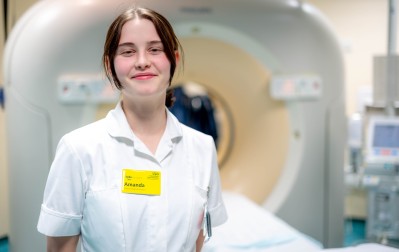
The department consists of two wide-bore static 1.5 T MRI scanners, and a visiting mobile 1.5 T scanner (this is currently sited at Chesterfield Royal Hospital – from later in the year this will be sited permanently at the Community Diagnostic Hub at Walton Hospital).
These scanners are run by our highly trained, caring, and dedicated Radiographers.
The department runs a 7-day service operating from 07.30 – 20.20.
There are things to consider before an MRI scan. You will be sent an MRI safety questionnaire to complete before your appointment. Due to the powerful magnet, some patients may not be able to have an MRI scan if they have any of the following.
- Cardiac (heart) pacemaker or cardioverter defibrillator (pacing wire)
- Cochlear implant
- Neurostimulator
- Aneurysm Clip
- Occlusive clip/staple
- Implanted drug infusion pump
- Hydrocephalus shunt
- Metal fragments or shrapnel in the eye
- Heart valve
- Intravascular stent/filter/coil
- Ocular (eye) implant
- Retinal tack
- Penile implant
- Tissue expander/implant e.g., breast
- Any other metallic or magnetic implant
- Loop Recorder
- Continuous Glucose Monitor
- Metal fragment/s, shrapnel, bullet/s or pellet/s in the body.
Patients who have kidney problems, or who have had or are waiting for a liver transplant, may not be able to have contrast media. This is the name of a special dye which may be required for some patients to help improve the quality of the pictures taken.
Please tell the MRI staff prior to your appointment if any of the above points apply to you by telephoning the Imaging Department on 01246 512627. (08.30-12.30, 14.00-17.30 Monday-Friday).
Patients will be asked to arrive 10 minutes before your stated appointment time to enable us to check through your completed questionnaire.
Metal objects such as clothing zips, clasps and buckles can disrupt the scan image so you will be asked to change into a top and trousers that we provide. Or you may prefer to bring your own light, comfortable clothing that does not have any metal fasteners, such as a tracksuit or cotton pyjamas, to change into.
You will also be asked to remove the following items before having your scan:
- Jewellery (you may keep your wedding ring on)
- Hearing aid
- Metal dentures
- Bank or any other cards with a magnetic strip (e.g., library/swipe card)
- Skin patches
- Body piercings
- Spectacles
- Watch
- Any loose metal objects e.g., money, keys
- Eye make-up (mascara and eyeliner contain iron!)
We will store your valuables securely in a locker while you have your scan, and you will keep the locker key with you at all times.
The Radiographer will explain what is going to happen during the examination, you will have a chance to ask any questions. You will then be asked to lie on the MRI table, and a piece of equipment may be placed around the area of the body being scanned. The Radiographers will try and make you as comfortable as possible, as you must keep still throughout the examination.
Once ready the table will move you into the scanner and the examination will begin. The scanner makes lots of loud noises which is perfectly normal.
For some scans, it may be necessary for you to have an injection of a fluid called “contrast media” or a muscle relaxant called Buscopan. If this is required a full explanation will be given to you at the time and the injection will be made into a vein in your arm.
If you have received an injection, you will be asked to remain in the department for 20 minutes after the injection. This is to monitor for any possible side effects from the contrast.
On average scans will last between 20 and 50 minutes.
MRI scans are considered safe but there are potential risks associated with implanted biomedical devices. This is why it is necessary to complete a safety screening questionnaire prior to the MRI Scan. Your scan may be deferred if we are unsure of the compatibility of an implant.
There is also a small risk that the patient may be allergic to the contrast media/dye; any previous reactions should be mentioned to the radiographer, before your scan. It is very rare for patients to have an allergic reaction to the dye used for MRI scans. However, if this does occur there will be staff on site who are trained to deal with any adverse reactions immediately.